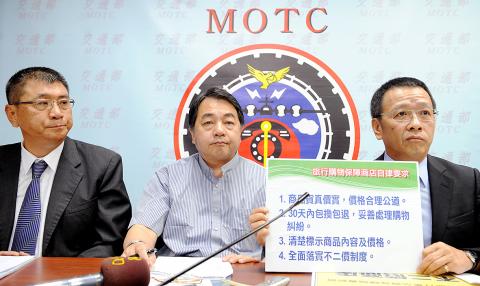The Tourism Bureau yesterday said it would introduce stricter punishments for travel agencies that fail to comply with guidelines on providing quality tour services following a series of violations that have disrupted order in the market.
Tourism Bureau Deputy Director General David Hsieh (謝謂君) said the bureau would amend the “Guidelines on Arranging Quality Tour Groups in Taiwan for Chinese Tourists” (旅行業接待大陸地區人民來臺觀光旅遊團品質注意事項) and raise the penalty for travel agencies that fail to follow these guidelines.
The names of the violators would not only be posted on the Web site of the Taiwan Strait Tourism Association, the quasi-official organization representing the Tourism Bureau, but they would also be forwarded to Chinese travel agents that help organize tour groups to Taiwan, he said.

Photo: Chu Pei-hsiung, Taipei Times
Chen Mei-hsiu (陳美秀), a section chief at the bureau, said the bureau had penalized a total of 83 travel agencies since Taiwan opened the door to Chinese tourists in 2008.
ILLEGAL GUIDES
Chen cited as an example a case the bureau discovered this year.
“There was this illegal tour guide who was using the name of a legal tour guide to lead a tour group,” Chen said. “We later found out that the travel agency that the legal tour guide was working for had been using his name to form different tour groups.”
Chen said the travel agency was suspended for a year.
She said the bureau hoped that changes to the guidelines would enable the bureau to suspend the business of any travel agency immediately if it committed any major violation, instead of allowing it to accumulate a certain number of demerits first.
Aside from the stricter penalties, Chen said the amendment would require that Chinese travel agencies complete payment of all tour group charges and fees within 45 days after the group leaves Taiwan.
In related developments, the Travel Agent Association (TAA), Travel Quality Assurance Association and Tourist Guide Association — the nation’s three largest tourism associations — yesterday jointly pledged to upgrade quality by ridding the market of unreasonably low-priced tour groups for Chinese travelers.
SELF-DISCIPLINE
TAA chairman Yao Ta-kuang (姚大光) said 169 local travel agencies, which account for about 90 percent of the inbound tourism market, had voluntarily signed a self-disciplinary pact to maintain market order, which will take effect next month.
“They [travel agencies] will abide by the regulations that set the daily tour rate for each Chinese tourist at no lower than US$60,” Yao said. “They cannot demand more than 30 percent of the commission in any shopping tour, either.”
Yao said the announcement may in the short term affect the number of Chinese tourists visiting the country, but he said it was the only way to ensure a sustainable development of this tourism segment.
“We would rather attract customers with quality service rather than low prices,” Yao said.

The inspection equipment and data transmission system for new robotic dogs that Taipei is planning to use for sidewalk patrols were developed by a Taiwanese company, the city’s New Construction Office said today, dismissing concerns that the China-made robots could pose a security risk. The city is bringing in smart robotic dogs to help with sidewalk inspections, Taipei Deputy Mayor Lee Ssu-chuan (李四川) said on Facebook. Equipped with a panoramic surveillance system, the robots would be able to automatically flag problems and easily navigate narrow sidewalks, making inspections faster and more accurate, Lee said. By collecting more accurate data, they would help Taipei

STATS: Taiwan’s average life expectancy of 80.77 years was lower than that of Japan, Singapore and South Korea, but higher than in China, Malaysia and Indonesia Taiwan’s average life expectancy last year increased to 80.77 years, but was still not back to its pre-COVID-19 pandemic peak of 81.32 years in 2020, the Ministry of the Interior said yesterday. The average life expectancy last year increased the 0.54 years from 2023, the ministry said in a statement. For men and women, the average life expectancy last year was 77.42 years and 84.30 years respectively, up 0.48 years and 0.56 years from the previous year. Taiwan’s average life expectancy peaked at 81.32 years in 2020, as the nation was relatively unaffected by the pandemic that year. The metric

TAKING STOCK: The USMC is rebuilding a once-abandoned airfield in Palau to support large-scale ground operations as China’s missile range grows, Naval News reported The US Marine Corps (USMC) is considering new sites for stockpiling equipment in the West Pacific to harden military supply chains and enhance mobility across the Indo-Pacific region, US-based Naval News reported on Saturday. The proposed sites in Palau — one of Taiwan’s diplomatic allies — and Australia would enable a “rapid standup of stored equipment within a year” of the program’s approval, the report said, citing documents published by the USMC last month. In Palau, the service is rebuilding a formerly abandoned World War II-era airfield and establishing ancillary structures to support large-scale ground operations “as China’s missile range and magazine

Passengers on Taiwan High Speed Rail (THSR) will be required to use headphones and make phone calls in gangways under new “quiet travel” rules starting Sept. 22. THSR Chairman Shih Che (史哲) told media that THSR will run a three-month promotional campaign to ensure widespread adoption of the new rules. Those repeatedly ignoring the guidance face the potential termination of their transport contract, which can result in them getting escorted off the train, according to THSR. Shih shared his hope to cultivate an environment conducive to rest and reading for the train’s passengers, stating that these changes aim to “promote self-discipline” among passengers